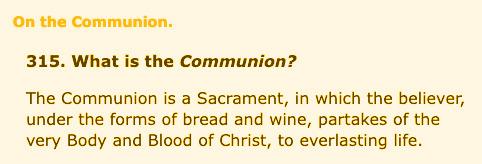Do The Orthodox Churches Believe And Teach Transubstantiation?
Eastern Orthodox, Greek Orthodox, Russian Orthodox, Byzantine, etc.
What we are doing here is showing you that the Orthodox Churches have a confusing – or at least an inconsistent or poorly defined – view of Transubstantiation. Never-the-less, they do tend to have views about it that are very similar to the Catholic view. And like the Catholic Church, they play “word games” to add a sense of mystery to their invented religious doctrines and practices. The Orthodox churches prefer to use the term “metabole” derived from the Greek word “metousiosis”, in place of the Latin word “transubstantiatio” for transubstantiation[1]. For the most part, Orthodox theologians believe that there is a real change of the bread and wine of communion, into the body and blood of Christ. Here is a brief description of the Orthodox Church view on communion, taken from one of their catechisms[2]:

Orthodox Christians mirror Catholics with their theological word salads, using phrases like “re-presentation of the mystical supper” to mimic the word salad that Catholics use to describe Transubstantiation. The only difference appears to be that the Orthodox want to “appear” different from Catholics, so they use the Greek word “metousiosis” instead of the Latin word “transubstantiatio”, to describe their brand of Transubstantiation. Here are some examples, in their own words, of this confusing and inconsistent language used to describe transubstantiation in the Orthodox Churches:
“The word ‘transubstantiation’ has several meanings in the Catholic and Orthodox churches. The Latin term metousiosis means ‘transformation’ or ‘transmutation’ while the Greek word metastoicheiose means “change.” Both terms describe the same process of change, but they have different meanings … Transubstantiation is a term used to describe the transformation of bread and wine into Christ’s body. Although there is no scientific explanation for transubstantiation, some Orthodox believe that the bread and wine are the real body and blood of Christ and that they are not changed from their physical appearance.”[3]
The following images are search engine results for the words “do the orthodox believe in transubstantiation”. And as you can see, some interesting, conflicting and confusing results showed up from that search.





Referenced articles on Transubstantiation and Metabole:
[1]Religion: Metousiosis
[2]The Longer Catechism of The Orthodox, Catholic, Eastern Church – also known as the Catechism of St. Philaret (Drozdov) of Moscow
[3]Transsubstantiation in the Orthodox Church